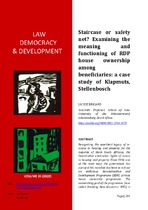Staircase or safety net? Examining the meaning and functioning of RDP house ownership among beneficiaries: A case study of Klapmuts
Abstract
Recognising the apartheid legacy of inaccess to housing and property for the majority of black South Africans, the Constitution entrenches rights of access to housing and property. Since 1994, one of the main ways the government has pursued this mandate has been to roll out an ambitious Reconstruction and Development Programme (RDP) private house ownership programme. The overarching goal of the programme (now called Breaking New Ground or BNG) is to establish "sustainable human settlements" that result in "sustainable development, wealth creation, poverty alleviation and equity". Speaking to the "wealth creation" and "equity" aspects, a key component ofBNG is "ensuring property can be accessed by all as an asset for wealth creation and empowerment". Thus, BNG is explicitly aimed at addressing inequality through asset formation. Yet, despite the considerable public resources spent on home ownership projects in South Africa, there is little understanding of the subjective meaning accorded to having an RDP house and the extent to which the financial function of private housing, as a wealth-generating asset (the Hernando de Soto "staircase" role), plays out in practice alongside its more poverty alleviation function as providing social security, including shelter (the "safety net" role). To contribute towards a better understanding of the role and value of RDP home ownership, I undertook a qualitative study among 21 beneficiaries of an RDP housing project in Klapmuts (Stellenbosch). The study provides some tentative conclusions regarding the utility and impact of the private ownership paradigm of these State projects.

